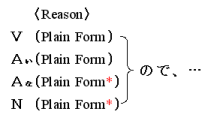「~ので、~」和本課 9-1 「それで」的意思相同,但不同的是「それで」是接續詞位於句首,而「ので」接續助詞 則放在句中。
「ので」的前面為非過去肯定形的「な形容詞」和名詞時,須將普通形(Plain Form)的 「だ」去掉,加上「な」。

![]() 兄は びょうきに なったので、学校を 休みました。
兄は びょうきに なったので、学校を 休みました。
哥哥因為生病了,所以請假沒去學校。

![]() この テープは だいぶ 古いので、いい 音が しません。
この テープは だいぶ 古いので、いい 音が しません。
這塊帶子因為舊了,所以放不出好音色。

![]() 図書室は しずかなので、よく べんきょうが できます。
図書室は しずかなので、よく べんきょうが できます。
圖書室因為很安靜,所以可以好好讀書。
參照:Lesson 10-7「よく わかりませんから、もういちど 先生に ききましょう。」
因為不太清楚,我們再一起去問老師吧。
|
【~ので、それで】【~から、だから】
ので and それで are often followed by a fact or a phenomenon consequent to a
preceding event. They are rarely used with sentences which has the following endings: ×~でしょう (conjecture ; probably~) ×~ましょう (proposal, suggestion ; Lets'~) ×~なさい(imperative ; e.g., Do it.) ×~てください(request ; Please~) etc. On the other hand, から and だから are often used with the above sentence endings. |

